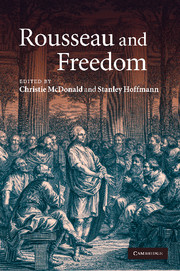Book contents
- Frontmatter
- Contents
- List of illustrations
- Notes on contributors
- Acknowledgments
- List of abbreviations
- Introduction
- PART I
- PART II
- 7 The Social Contract, or the mirage of the general will
- 8 “Par le bon usage de ma liberté”: freedom and Rousseau's reconstituted Christianity
- 9 The constraints of liberty at the scene of instruction
- 10 “Toutes mes idées sont en images”: Rousseau and the yoke of necessity
- 11 Rousseau's ruins
- 12 Can woman be free?
- 13 The subject and its body: love of oneself and freedom in the thought of Rousseau
- PART III
- Bibliography
- Index
10 - “Toutes mes idées sont en images”: Rousseau and the yoke of necessity
Published online by Cambridge University Press: 05 May 2010
- Frontmatter
- Contents
- List of illustrations
- Notes on contributors
- Acknowledgments
- List of abbreviations
- Introduction
- PART I
- PART II
- 7 The Social Contract, or the mirage of the general will
- 8 “Par le bon usage de ma liberté”: freedom and Rousseau's reconstituted Christianity
- 9 The constraints of liberty at the scene of instruction
- 10 “Toutes mes idées sont en images”: Rousseau and the yoke of necessity
- 11 Rousseau's ruins
- 12 Can woman be free?
- 13 The subject and its body: love of oneself and freedom in the thought of Rousseau
- PART III
- Bibliography
- Index
Summary
To know Jean-Jacques Rousseau is to take up his barbing challenge: “Judge the pictures of the soul.” The difficulty of coming to terms with the most self-baring writer of his time, who saw his life as “a long reverie divided into chapters by my daily promenades,” must be the primary starting point for any reflection on Rousseau, “a madman and a genius,” as Éric Weil (among others) has said. Rousseau's writings astound with brilliance and penetrating thought but also confound with obscurity and contradiction: “I relate simply what I thought I felt.”
But how do we do understand this for a writer who says that “all of my ideas are in images” (“toutes mes idées sont en images”)? It may be necessary to find what Rousseau, the writer of metaphors and transcriber of music, was imagining behind his words. I propose here a reading of Rousseau via the joug, the yoke, which is a constant presence in Rousseau's political, moral, and biographical writings. At the start of Book ii of the Confessions, Rousseau writes that the 16-year-old leaving Geneva could never have known that his life would be lived “under a yoke much harder than any I was able to bear”: this yoke structures a life.
“I will be free [or] no man will ever have been” is perhaps Rousseau's greatest theme, his constant struggle and preoccupation. Freedom in this world is what he seeks above anything else: freedom from opinion, from prejudice and dishonesty.
- Type
- Chapter
- Information
- Rousseau and Freedom , pp. 174 - 192Publisher: Cambridge University PressPrint publication year: 2010
- 1
- Cited by

